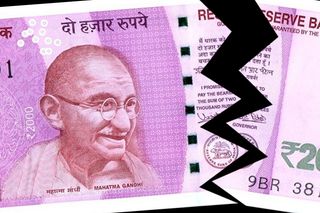
All the Arguments You Need: To Convince People Who Think the Gender Pay Gap Isn’t a Thing
Even if you’re only rewarded 62% for your efforts.

In our All The Arguments You Need series, we take on mindsets standing in the way of progress and rebut them with facts and logic.
Recent reports of Abhishek Bachchan denying that pay inequality is a problem — or even a thing — in Bollywood have been doing the rounds. “There’s a huge debate on gender parity in the film business and in other industries. I’ve worked in nine films with my wife and in eight of those, she’s got paid more than I have. The highest-paid actor in Piku was Deepika (Padukone),” he said, in a conversation with filmmaker Shoojit Sircar at a recent event. “It’s a business, and if you are a saleable actor, you get paid accordingly. You can’t be a new actress and demand to be paid the same as Shah Rukh Khan.”
These are tired old arguments and conflations that get trotted out whenever equal pay is discussed — and they’re dangerous because, on the surface, they sound so reasonable. But they’re not — they can and should be refuted. The next time you’re at a dinner party (or in the comments section of an Abhishek Bachchan interview) here’s what you can say.
“I know a woman in the same field and role as me, and she gets paid more than me/men I know.”
Good for her; she’s probably had to work twice as hard as a man to earn it. But one personal anecdote doesn’t change the fact that this woman is an anomaly. How many other women in the same field and role out-earn their male peers? How many earn at par to their male peers? Equal pay is not about the single woman at the top; it’s about the majority of women in the workforce who earn roughly Rs. 62 for every Rs. 100 (in India) earned by their male peers.
“The highest-paid person in my field is a woman.”
Again, good for her. There will always be outliers in any situation. Who are the next highest-paid people? And the next highest-paid people after that? You’ll probably see a disproportionate number of men in those groups.
Take, for example, Bachchan’s point that Deepika Padukone was the highest-paid actor in Piku; the question is not whether the lead actor in a movie is paid more than the rest of the cast — that seems like an obvious yes; the question is whether Padukone in Piku was paid at an equal rate — either outright, or in terms of percent of production cost — to Ayushmann Khurrana in, say, Shubh Mangal Savdhan. Or whether Swara Bhaskar in Veere Di Wedding was paid comparably to Farhan Akhtar in Rock On!!
“People get paid what they’re worth; if they bring in more revenue/value, they get paid more.”
The gender pay gap is well-documented across the world; therefore, this argument implies that the vast majority of women everywhere aren’t working hard or aren’t competent enough to bring in the same revenue or value to their employers as their male peers. This is just insulting.
This argument gets tossed around a lot in industries that have more nebulous, fame- and/or performance-based pay structures, like cinema and sports. For example, a common argument against equal prize money in sports is that men’s sports and male athletes attract many more viewers and, thus, generate more revenue — therefore male athletes deserve higher pay than female athletes.
This argument also appears with the variation: But the male field is just so much more competitive/interesting than the female field. Answer: First, women are still doing the same job. The fact that you find the level of play among male athletes to be more sophisticated doesn’t mean women aren’t performing equitably. The world has been conditioned to value men’s athletic prowess more than women’s, even at the top-most levels; viewership and resulting revenue, as well as perceived depth of competition, can’t be attributed to the male athletes themselves, but to a social value for masculine physical fitness.
Even assuming the female field is less competitive, that’s an argument in favor of equal pay, not against; equal pay would allow female athletes to afford the same resources — coaching, facilities, equipment, etc — that male athletes access, thus improving their play.
“People will get discouraged if we start paying everyone the same amount, because merit and performance won’t be rewarded.”
Equal pay isn’t about rewarding non-performers; it’s about rewarding people who perform at the same levels with the same compensation. To argue that pay parity will reward non-performance is necessarily to say that you don’t believe women perform at the same level as men.
“Women don’t perform at the same level of men, so they can’t be expected to be paid the same yet.”
This is a red herring; equal pay is about equal recompense for comparable performance. And every day, far more women perform at the same level as men, than under- or over-perform compared to men. These women are not getting fairly recompensed.
This argument is typically trotted out in the contexts of sports; female athletes can’t perform at the level of male athletes, therefore their performance is deserving of less prize money. Again, this confuses issue. A female athletes job is not to outperform/win against a male athlete, just as a male athlete’s job is not to outperform/win against a female athlete. Her job is to win against her competitor, just as his is to win against his competitor. They are performing the same job — yet average prize money and salaries for female athletes are vastly lower than those for male athletes.
This argument is also used in fields that aren’t divided by biology. For instance, there is nothing, biologically speaking, that would prohibit women from becoming top chefs, or chess masters; yet, few to none of the world’s culinary leaders or chess masters are women — hence, they simply don’t perform at the same level as men. But that is a simplistic conclusion; for all of fine dining’s, or chess’s, history, women have been discouraged from pursuit. Men, on the other hand, have been taught these fields are appropriate for them to pursue, taught to find value in achievement therein, and have built and funded systems to facilitate the development of more men within these industries. Women are just beginning to be accepted in these fields and avail of institutional support; the fact that women’s representation among the upper echelons of these professions is much less is not evidence of women’s sub-par performance, but of their nascent access to these professions.
Which ultimately means this argument promulgates a larger problem: a societal view that male performance is the ideal that women must live up to. Because of this mindset, skills that appear both valuable to employers and more common among women — teamwork, credit-sharing — have historically gone undervalued.
Finally, there is every indication that women often outperform men even on male-centered metrics of success; in one study, female leaders outscored male leaders across the board, but by the widest margin in taking initiative and driving for results — two traits considered stereotypically ‘male.’ Yet the gender pay gap persists, and often widens, at the level of leadership.
“Men have families to support, so they need a higher paycheck.”
This promotes the backward assumption that men should be breadwinners and women should be caretakers. It also further perpetuates an unequal bar for merit-based recompense. Why does fatherhood deserve a bigger pay check, while motherhood has been proven, time and again, to inhibit women’s earnings?
Finally, in case no one has noticed, people are not paid according to how much they “need” the money.
“Women choose lower-paying jobs, so they can work less or have more flexible hours.”
Equal pay isn’t about comparing industries against each other. It’s about comparing commensurate roles within industries. The question isn’t whether a female teacher (a low-paying field dominated by women) is making as much as an investment banker (a high-paying field dominated by men). The question is whether a female teacher with the same experience and role, is making as much as a male teacher; whether a female investment banker with the same experience and role, is making as much as her male peers in investment banking.
We’ll leave aside the societal problems — like a lack of equal parental leave — that force women into making decisions that sacrifice pay and career advancement for the ability to care for their families.
“Women are bad negotiators. Men are just better at negotiating their salary.”
Salary negotiation is an option in very few industries, at very few levels — generally the top levels, which women struggle to access to begin with. Therefore women’s negotiating skills (if they are really sub-par) aren’t responsible for a gender pay gap that spans fields and levels.
Finally, even if the ability to negotiate a salary was more widespread, why should women, who bear the brunt of a flawed and unequal system, be held responsible for fixing it? Businesses are responsible for what they choose to pay their employees, full stop. They either choose to value the equal work of employees equally, regardless of gender and negotiating skills, or they don’t. They don’t — and that is exactly what needs to change.
Related


More Than Half of Indian Parents Want Their Children To Become Teachers, Survey Finds
